Volume 6, number 18
September 23, 2002
How university affected my faith
How university affected my faith
How have university studies influenced your Christian faith? Canadian Mennonitecorrespondents asked this question of 10 students who graduated from university or college this spring. Their responses are below. See also Focus on Education, pages 22-26.
Holistic view of patients
Rachel Neufeld received a nursing diploma after two years of training at Hesston College in Kansas. This spring she graduated from the University of Alberta in Edmonton with a Bachelor of Science degree in nursing. While in Edmonton, she attended Holyrood Mennonite Church.
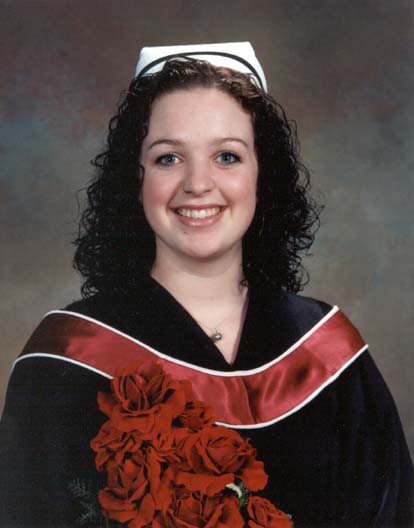 “My two years at Hesston were very significant,” Neufeld commented. “They brought faith into giving nursing care and helped me with how I can be a support and strength for my patients. I went into nursing with a biology mindset and came out with a much more holistic view of the person.
“My two years at Hesston were very significant,” Neufeld commented. “They brought faith into giving nursing care and helped me with how I can be a support and strength for my patients. I went into nursing with a biology mindset and came out with a much more holistic view of the person.
“Nursing is different from other medical professions,” she noted. “Nurses...give care to the emotional and spiritual needs as well as the physical.” A course on spirituality in nursing was especially significant in connecting faith and work.
Her study at the University of Alberta stretched her faith in a different way. In this secular setting, Neufeld learned to respect and adapt to the needs of patients from a variety of cultures, religions and lifestyles.
A Muslim patient on bed rest was having trouble facing east for prayer. “Even though it was awkward, we managed to turn his bed in the room so he could face the right direction.”
Answering questions also challenged Neufeld’s faith. She dealt with patients and families experiencing death and grief, and was asked to pray with and for patients.
“Being able to show through who I am that I’m Christian is very important. My faith gives me strength to go into some of the places that are amoral or atheistic and still give quality care,” she said.
For the past two summers, Rachel worked as camp nurse at Rocky Mountain Mennonite Camp in Colorado. Now she has signed on with a “travel” agency which supplies nurses to a variety of hospitals across the United States on a 12-week contract basis. Her first contract is in Montana.
“Eventually I’d like to get my nurse practitioner certificate and do some long-term MCC overseas work. I’m interested in different cultures, learning languages, and travelling. I’m definitely not a moss grower!”
Because of the moving she is doing, Neufeld has kept her membership at the Cedar Hills Mennonite Church in Surrey, B.C. where her father used to be the pastor. She keeps the congregation in touch with what’s happening to her and goes to Mennonite churches when she can.
—Donita Wiebe-Neufeld
Bible studies and
practical skills
Karen Brown, a member of the Bergthal Mennonite church in Didsbury, Alberta, graduated from Canadian Mennonite University this spring with a general Bachelor of Arts degree.
“I wouldn’t trade those three years for anything,” she said. “I gained a strong foundation for the rest of my studies and life. It’s a good place to learn how to learn”.
The transition from Canadian Mennonite Bible College to Canadian Mennonite University was a bit bumpy, Brown admitted, but overall she feels it was a good change.
“It brought a breath of fresh air to all of us. We’ve had to learn to appreciate different worship styles in chapel, and we’ve experienced a bit of loss of the sense of community because the school has grown so much. However, this is still a great community”.
The first year at school was challenging.
“Everything you thought you knew gets tossed out the window and you need to start again. The professors did not dumb things down for the students. We learned about historical context for scripture and the Bible really became more human for us,” she said.
“I loved the challenge.... I was taught how to have a critical eye that helps me to understand and ask good questions. One of our text books helped me see Jesus as human and his actions as having political consequences. It made him more accessible for me.”
Another challenge in the first year was learning the language of theology. “At first, I took for granted that everyone speaks and thinks the same way,” said Brown. “I had to learn the language of theology before I could really start to understand what was being taught.”
Another significant learning experience was a management practicum. Brown was one of four students chosen to head up the Blaurock Café on campus. The café features fair trade coffee and baked goods from two local bakeries who use locally grown, organic produce.
“This was the perfect, no-risk way to gain some great management experience,” she said. Proceeds go to student council and to charities. She spent the summer on the maintenance crew at CMU.
This fall she began a year of studies at the University of Winnipeg to obtain an English degree. She is considering teachers college. Brown attends Bethel Mennonite Church in Winnipeg.
—Donita Wiebe-Neufeld
Both study settings
challenged faith
They grew up miles apart and don’t know each other, but Kendra Loewen and Faith Bock have something in common: both studied at Simon Fraser University in Burnaby, B.C., and both have also studied in a Christian environment.
 Bock, from First Mennonite Church in Burns Lake, B.C., graduated this spring from Simon Fraser with a bachelor’s degree in education. Prior to that, she spent four years completing an arts degree at Trinity Western University in Langley, B.C.
Bock, from First Mennonite Church in Burns Lake, B.C., graduated this spring from Simon Fraser with a bachelor’s degree in education. Prior to that, she spent four years completing an arts degree at Trinity Western University in Langley, B.C.
She says her experiences in the two universities were different, but not necessarily because TWU is Christian and SFU is not.
“While doing my BA [at Trinity Western], I was going from class to class and had different people in each class,” she says. “But at SFU I was in the professional development program with the same people for the entire year.”
And attending a Christian university didn’t mean she wasn’t challenged in her faith experience.
“They totally challenge you to make your faith your own. You can grow or slide even at a Christian university,” she says. For her, it was “a good challenge and a good experience.”
Loewen, who attends Peace Mennonite Church in Richmond, B.C., was in her fourth year of a business administration degree at Simon Fraser when she decided to take a year off and attend Canadian Mennonite University in Winnipeg. She found that the experience at CMU helped her to own her faith and to define herself as a Mennonite.
“In contrast to my studies at SFU, my time at CMU was more than a narrow preparation for career, and more of a preparation for life,” she says. “I learned about my Mennonite heritage and the history of the theology to which I ascribe. I am now able to articulate more specifically what I believe and claim it as my own, rather than calling myself Mennonite by virtue of attending a Mennonite church.”
Also important to Loewen was the development of her peace theology. She
found her experience at CMU gave words to what she was learning and how to incorporate that into daily life.
“I have come to an understanding of the biblical concept of shalom that involves harmony between us and God, each other and all of creation,” she says.
Both women found that living on campus in a Christian environment gave them an opportunity to experience community and value the church as the body of Christ.
Loewen will return to SFU this fall to complete her degree in business administration.
—Angelika Dawson
Commitment to
human rights
Katherine Conrad graduated from McGill University in Montreal last spring, having completed a four-year joint honours program in political science and history. I reached her at her parents’ home (Ron and Mary Conrad) in Thornhill, Ontario. The Conrads attend the Hagerman Mennonite Church.
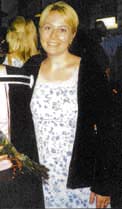 What captured her interest in those two areas of study? In political science she studied international politics, with a focus on developing areas of the world, particularly in peace-building and post-conflict reconstruction. She studied the interaction between nongovernmental organizations, governments, foreign donors and the beneficiaries of foreign aid. Her studies included classes on the Middle East, South Africa and Latin America.
What captured her interest in those two areas of study? In political science she studied international politics, with a focus on developing areas of the world, particularly in peace-building and post-conflict reconstruction. She studied the interaction between nongovernmental organizations, governments, foreign donors and the beneficiaries of foreign aid. Her studies included classes on the Middle East, South Africa and Latin America.
For the history portion, Conrad focused especially on Latin America because she had lived in Mexico during a high school exchange. Because she was with her parents in Spain for a year, she speaks Spanish.
“I guess my whole family is oriented towards social justice,” she said. Thus her studies, her experiences abroad and her family milieu have created her interest in international concerns.
As part of her BA program, Conrad took two religious studies courses, one on violence and nonviolence, in which Mennonites were frequently cited. Most of her peers were not particularly religious, but they enjoyed talking about religion nonetheless.
“University helped me grow a lot as a person in many ways, both intellectually and socially. It gave me a bigger perspective on the world...and that may also relate to my understanding of ‘faith.’ I continue to ponder issues of faith and its relevance to my life.”
Conrad occasionally attended the Mennonite Fellowship of Montreal. She enjoyed the congregation because of its small size, its urban setting and diverse composition. She also appreciates their community work.
As she enters law school at the University of Windsor this fall, Conrad hopes to build on her interests by studying international and human rights law.
—Maurice Martin
Learned power of prayer
Alissa Bender grew up in Baden, Ontario, and attended the Steinman Mennonite Church where she was MYF (youth group) president for two years. She enjoyed developing programs for the youth in her church. Her pastors were very influential in her life and her parents a strong support and reference for her.
Bender always felt that there was a place for her in the church and she worked at being connected, attending conferences on a regular basis. She developed a personal faith, aware of her parents’ and sister’s influence on her life.
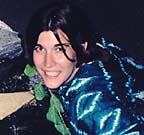
In 1997, after graduating from high school, Bender spent a year-long SALT term in Chad, Africa. This was a life-changing experience. She says that she looks at her life as “Before Chad, Chad, and After Chad.” Chad taught her many things but where she experienced the greatest growth was in her prayer life.
She learned the power of prayer in situations she didn’t understand—when she didn’t know how to relate to the culture she would go into prayer and she was enabled to see responses on many levels. Bender developed a broader world view; she learned to live life day by day and to take life as it comes. God was her only reference—she couldn’t call up or e-mail friends.
After returning from Chad, Bender went to Wilfrid Laurier University. She initially went into Business Administration but the talk about “money (not people)” and the “bottom line” were a growing frustration. She struggled with the consequences of large multinational businesses.
After a year, she changed her major to French. (While in Chad, she discovered how much she enjoyed languages.) She was a residence don at Conrad Grebel College for one year and chapel program leader for one term.
As a don, she learned different ways of relating to people and discovered that her faith could be a support to others. She was challenged to think in different ways, enabling her to develop a different worldview again.
The chapel experience confirmed how much she enjoyed being involved in worship planning and the challenge of incorporating people of different backgrounds in worship in meaningful ways.
Rooted in a supportive home and church, Bender has experienced a growing, risking faith. She was freed to be vulnerable and to go to Chad where her faith was shaped and she gained a sense of self. In the context of Grebel and Laurier she developed a new sense of who she was.
Now Bender is facing the future, wondering who God is calling her to be. She is prayerfully seeking God’s counsel, knowing that the new puzzle piece of her life will be contingent on the pieces that are already there.
—Marg Warren
Study abroad shaped faith
Elisa Suderman Barkman graduated from Canadian Mennonite Bible College (CMBC) in spring with a Bachelor of Theology degree. This summer she worked as pastoral intern at Home Street Mennonite Church in Winnipeg, where she is a member.
Suderman, with her new husband, Paul Barkman, moved to Shipshewana, Indiana, at the end of August for a year of voluntary service as hosts at Menno Hof, a Mennonite Amish Museum. They will give tours, clean and provide maintenance.
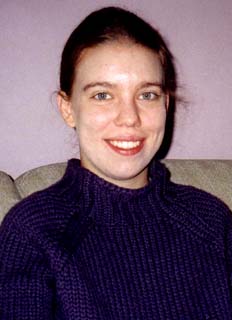 Suderman’s years at CMBC, now Canadian Mennonite University, were significant in shaping her faith.
Suderman’s years at CMBC, now Canadian Mennonite University, were significant in shaping her faith.
“In a small community setting, there’s lots of opportunity for open dialogue outside of classes on class subject matter,” said Suderman.
Suderman’s involvement for three years on the Peace and Social Awareness Committee, which she chaired this past year, stretched and clarified her understanding of faith.
“The amalgamating of two different student bodies with different understandings meant that much time went into discussing what faith and action meant,” Suderman explained, referring to the joining of CMBC and the Mennonite Brethren Concord College. “A core group from my first year who are now CPTers [Christian Peacemaker Team members] were important in terms of pushing and supporting me.”
In her second year, Suderman studied in the Philippines at Silliman University Divinty School through a CMU exchange program. That setting strengthened her understanding of the connection between faith and action.
“There it was not a question of whether to act or not but what kind of action.... Faith and life and church were so intertwined. I was fully accepted into that community. That aspect of hospitality had a big impact on me. You were not just an observer, you were a participant.”
Seeing how church and faith were integral to daily life for people in the Philippines drew her to consider the pastorate.
“I am quite aware that pastoral work there and here are different.... During this summer’s internship, unless I went and visited, I would see people mostly just on Sundays.”
“For me, lifestyle is an integral part of faith...being aware of how my lifestyle choices affect others. Being at CMBC, a community where that’s important, has a lot to do with this.”
She adds, “I would like to take my Master of Divinity somewhere outside of North America, but I’m open to different possibilites.”
—Evelyn Rempel Petkau
A better scientist
Ashley Dyck, 21, graduated from the University of Winnipeg with a Bachelor of Science degree in chemistry this spring. She is a member of the North Kildonan Mennonite Church in Winnipeg.
Currently, she is in a Masters program at the University of Manitoba (and got married on September 14). She plans to pursue her PhD in Human Anatomy and Cell Science at UM. As part of her Masters program, Dyck works in a lab at the Health Sciences Centre in research on muscular dystrophy.
“I would like to teach but I also want to do research. I want to look for work that will be a balance of the two,” said Dyck.
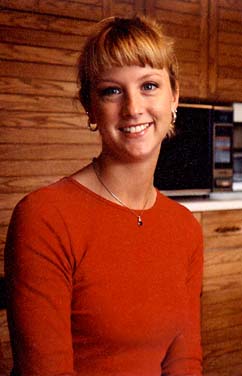
Her studies challenged her faith, she said, making her faith journey both harder and easier.
“Science takes a lot of time. I can’t be as involved in other activities as I used to be. Science has an explanation for everything.... It tries to explain everything but at the same time it is based on theories. You have to decide between the theories and that there are some things that can be explained by faith. You don’t know why it happened, it just happened. So it definitely leaves room for faith,” said Dyck.
At times leaving room for faith has been difficult while working so intensely with science, Dyck acknowledged.
Dyck attended public school prior to university. The circle of Christian and non-Christian friends she developed helped to shape and strengthen her faith. She found Varsity Christian Fellowship at UW helpful and appreciates the friendship she developed with her youth pastor, Erin Morash, at North Kildonan Mennonite.
“She was extremely helpful and always more than willing to discuss questions I had,” said Dyck.
Dyck believes that her faith has made her a better student and scientist. “Because of my faith I was more skeptical of the theories and always questioned them. It’s made me a better scientist, especially in research.”
“I try for a balance and not let science rule my life. It’s easy to let that happen.”
—Evelyn Rempel Petkau
Faith didn’t change
Ernest Fast is a recent graduate of University of Saskatchewan’s Agriculture program. But he’s not heading for a regular salary just yet.
“I could be an Ag Rep or a Chemical Rep,” he said, “But I’ll probably just stay with the farm for right now.”
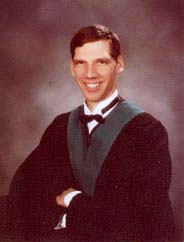
Staying with the farm is a hard decision to make these days. In the midst of a drought, Fast together with his family is pulling in possibly their lowest yield ever. With typical prairie stoicism, he admits “it’s tough” but plans to continue.
They don’t call this land “Next Year Country” for nothing.
Fast decided on the Diploma of Agriculture program after talking with friends and neighbours. His boss at the Seager Wheeler Farm also recommended it.
“I went to learn new techniques and make better decisions about the business,” he said.
While studying in Saskatoon, the 23-year-old Rosthern area native was able to come home on weekends. He was able to attend his home church, Rosthern Mennonite, every weekend.
The strong and loving ties of his faith community stretched enough to let him go and rebounded to welcome him back.
“My faith didn’t really change during university,” he noted. It remained strong.
—Karin Fehderau
Community-based faith
Melissa Bartel was only 17 years old when she headed off to Canadian Mennonite Bible College (now Canadian Mennonite University). The Saskatoon teenager from Wildwood Mennonite Church wanted a taste of dorm life and to see for herself what Bible College was all ab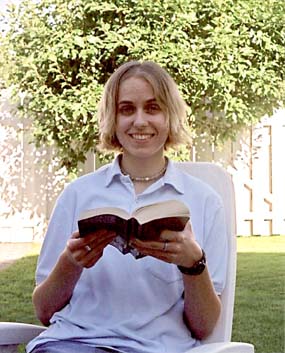 out.
out.
“My parents had both attended CMBC and so had my relatives,” she said. Feeling the need to get away and not knowing what she wanted next, Bible college seemed like a good interim solution.
That was three years ago. This past spring, Bartel graduated from CMU with a Bachelors degree in Theology. And she claims it was time well spent.
“It was the best three years of my life,” she said.
During her stay, she noticed how the dorm population changed to include more than just General Conference or Mennonite Church Canada Mennonites. Because of the amalgamation of the three Winnipeg colleges, there were people from more varied backgrounds coming to CMU during her second and third year. All of this contributed to a new appreciation for other believers.
“I now have a community-based faith,” she says of her dorm experience. Living with similar-minded students gave her a chance to work through issues in a challenging yet caring environment.
Being at the school on September 11, 2001 was also an eye-opener toward a Christian perspective.
“Yes, we prayed for the Americans who were hurting, but we also prayed for people in Afghanistan.”
Her faith was also impacted by a renewed sense of service. And the practical outworking of her faith began to emerge.
“Social awareness was pushed to the forefront of my mind,” she explained. This directed her to sign up for eight months with Mennonite Disaster Service. West Virginia will be her final destination in the fall.
Following her stint there, she hopes to study psychology at the University of Manitoba on her way to becoming an Art Therapist.
—Karin Fehderau